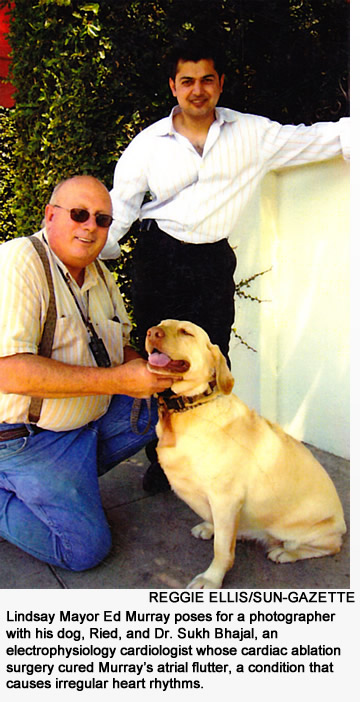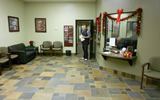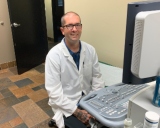By Reggie Ellis -SUN-GAZETTE - Wednesday September 3, 2008.
 On January 23, 2008 Lindsay Mayor, Ed Murray, got a frantic call from his doctor. "He started yelling into the phone asking me what I was doing and to sit down wherever I was and wait for an ambulance," Murray said. "I told him that I felt fine, I didn't know what he was talking about." The doctor explained that he had just looked at Murray's EKG and found an arrhythmia, or abnormal heart rhythm. Murray casually called a friend who lived around the corner and asked if he could drive him to the hospital. "It seemed like everyone was worried but me," Murray said. "I guess I was too dumb to know any better." Murray was suffering from atrial flutter, a condition where a circuit of erroneous electrical signals form in the upper chamber, or atrium, of the heart. Murray's doctor said the upper chamber was beating 300 beats per minute, more than three times the normal rate. Murray's doctor told him about a procedure that was new to Tulare County called catheter ablation and referred Murray o Dr. Sukh Bhajal, an electrophysiologist. Cardiac electrophysiology (EP) is the study of the heart's electrical system, which includes slow heart rates, fast heart rates, and passing out spells. Bhajal is a self-described electrician of the heart and is the only electrophysiologist between Fresno and Bakersfield certified to perform catheter ablation. "By eliminating the bad cells we can restore the proper electrical signals controlling the heart," Bhajal said. Catheter ablation involves inserting a thin, flexible wire into a vein in the groin. The wire is then passed through the blood vessel to the heart where a 3-D mapping system is used to locate and destroy the short-circuiting cells causing the irregular impulses. “Without this cure, Mr Muray would have needed a pace-maker and be put on blood thinner medication for the rest of his life," Bhajal said. "Now he has no cardiac issues at all." Murray went in for the procedure at 5:30 p.m. on a Thursday evening, and it took between two to three hours. He was released from the hospital the next morning and resumed work that afternoon. Catheter ablation of atrial flutter is 98% effective and carries a low risk of complications.
On January 23, 2008 Lindsay Mayor, Ed Murray, got a frantic call from his doctor. "He started yelling into the phone asking me what I was doing and to sit down wherever I was and wait for an ambulance," Murray said. "I told him that I felt fine, I didn't know what he was talking about." The doctor explained that he had just looked at Murray's EKG and found an arrhythmia, or abnormal heart rhythm. Murray casually called a friend who lived around the corner and asked if he could drive him to the hospital. "It seemed like everyone was worried but me," Murray said. "I guess I was too dumb to know any better." Murray was suffering from atrial flutter, a condition where a circuit of erroneous electrical signals form in the upper chamber, or atrium, of the heart. Murray's doctor said the upper chamber was beating 300 beats per minute, more than three times the normal rate. Murray's doctor told him about a procedure that was new to Tulare County called catheter ablation and referred Murray o Dr. Sukh Bhajal, an electrophysiologist. Cardiac electrophysiology (EP) is the study of the heart's electrical system, which includes slow heart rates, fast heart rates, and passing out spells. Bhajal is a self-described electrician of the heart and is the only electrophysiologist between Fresno and Bakersfield certified to perform catheter ablation. "By eliminating the bad cells we can restore the proper electrical signals controlling the heart," Bhajal said. Catheter ablation involves inserting a thin, flexible wire into a vein in the groin. The wire is then passed through the blood vessel to the heart where a 3-D mapping system is used to locate and destroy the short-circuiting cells causing the irregular impulses. “Without this cure, Mr Muray would have needed a pace-maker and be put on blood thinner medication for the rest of his life," Bhajal said. "Now he has no cardiac issues at all." Murray went in for the procedure at 5:30 p.m. on a Thursday evening, and it took between two to three hours. He was released from the hospital the next morning and resumed work that afternoon. Catheter ablation of atrial flutter is 98% effective and carries a low risk of complications.
Heart Facts
Heart disease is the number one killer in America, accounting for one of every five deaths, or about half a million people in the country. Every 26 seconds, an American will suffer in coronary event, and every minute someone will die from one, according to the American Heart Association. That's more than the number of deaths each year from breast cancer, lung cancer, stroke, or AIDS combined, ac-cording to Sudden Cardiac Ar-rest Coalition. Two simple screening tests, called an electrocardiogram (EKG) and/or an echocardiogram (echo), can:
-
Check the health of the heart when other diseases or conditions are present, such as high blood pressure, high cholesterol, cigarette smoking, diabetes, or a family history of early heart disease.Find the cause of unexplained chest pain, shortness of breath, dizziness, fainting, or rapid, irregular heartbeats (palpitations). Check the heart's electrical activity. - Screen for Congestive Heart Failure Determine a patient's ejection fraction (EF), which is the fraction of blood pumped out of ventricle with each heart beat. The normal EF is 55-60%, and if the EF is less than 35%, the patient is at risk of sudden cardiac death, and is a candidate or an implantable cardioverter defibrillator (ICD).An ICD is a small battery powered electrical impulse generator which is implanted in patients who are at risk of sudden cardiac death due to fatal arrhythmias from the lower heart chambers. The device is programmed to detect cardiac arrhythmias and correct it by delivering a jolt of electricity.
-
An ICD is 98% effective at protecting those at risk of sudden cardiac arrest. About 50% of the patients treated by Bhajal require pacemaker or defibrillator implants. Bhajal recently returned to the Central Valley to establish in EP practice and laboratory after extensive training in Wisconsin and Kentucky. Bhajal was born in Punjab, India where his family farmed 20 acres of sugar cane, wheat, cotton, and corn. At the age of 7, his family moved to Turlock, Calif. where they farmed 180 acres of cotton. "I came back to the Valley to offer this service to people who live in a very underserved area," Bhajal said. "People used to have to go to Fresno or the Bay Area to receive these types of treatments, and now they can get them here in Tulare County." Bhajal performs his procedures at both Turlare District Hospital and Kaweah Delta Hospital. For information on ICD therapy, cardiac ablation, or general questions about Dr. Sukh Bhajal's practice, please call his office at (559) 635-4800.



